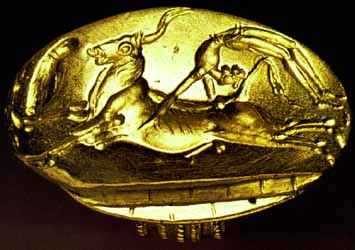
Our Minnesota weather's been lushly Mediterranean of late, so naturally (such is the life of the wandering scholar) I've been thinking about bull-leaping.
I'm wondering if maybe—just maybe—the scholars have got it wrong.
Admittedly, my knowledge of the literature on the subject is not exhaustive. Still, on the basis of information available (to me, at any rate), I have the impression that much, if not most, current scholarship assumes that what we see depicted in Minoan art—what Mary Renault so charmingly calls the Bull Dance—is a sport, if perhaps a sport with religious overtones. Discussion tends to center on whether such a sport would actually have been physically possible or not.
I am given to understand that the scenes of bull-acrobatics that we see—on the golden ring-seal shown above, for example—are simply not possible; that bulls gore sideways rather than upwards, as the leaping scenes would imply. Contemporary athletes have been unable to duplicate the classical frontal bull-leap shown in Minoan art.

 Thank you for this honest look at Minoan art. There is so much misinformation out there which is extremely frustrating.
Thank you for this honest look at Minoan art. There is so much misinformation out there which is extremely frustrating.

















